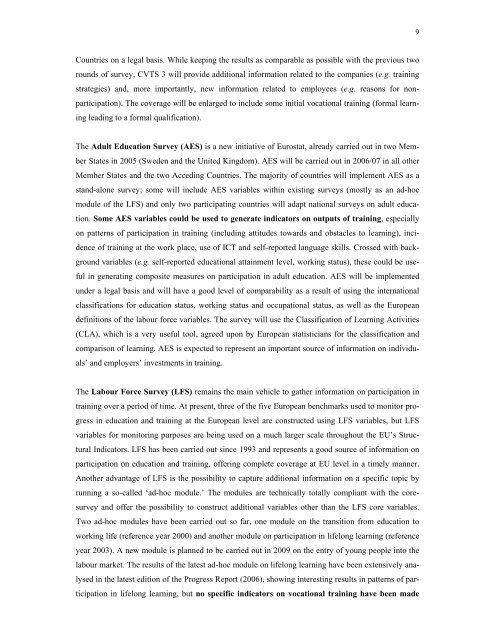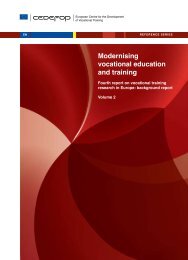measuring the outputs and outcomes of vocational training
measuring the outputs and outcomes of vocational training
measuring the outputs and outcomes of vocational training
You also want an ePaper? Increase the reach of your titles
YUMPU automatically turns print PDFs into web optimized ePapers that Google loves.
9<br />
Countries on a legal basis. While keeping <strong>the</strong> results as comparable as possible with <strong>the</strong> previous two<br />
rounds <strong>of</strong> survey, CVTS 3 will provide additional information related to <strong>the</strong> companies (e.g. <strong>training</strong><br />
strategies) <strong>and</strong>, more importantly, new information related to employees (e.g. reasons for nonparticipation).<br />
The coverage will be enlarged to include some initial <strong>vocational</strong> <strong>training</strong> (formal learning<br />
leading to a formal qualification).<br />
The Adult Education Survey (AES) is a new initiative <strong>of</strong> Eurostat, already carried out in two Member<br />
States in 2005 (Sweden <strong>and</strong> <strong>the</strong> United Kingdom). AES will be carried out in 2006/07 in all o<strong>the</strong>r<br />
Member States <strong>and</strong> <strong>the</strong> two Acceding Countries. The majority <strong>of</strong> countries will implement AES as a<br />
st<strong>and</strong>-alone survey; some will include AES variables within existing surveys (mostly as an ad-hoc<br />
module <strong>of</strong> <strong>the</strong> LFS) <strong>and</strong> only two participating countries will adapt national surveys on adult education.<br />
Some AES variables could be used to generate indicators on <strong>outputs</strong> <strong>of</strong> <strong>training</strong>, especially<br />
on patterns <strong>of</strong> participation in <strong>training</strong> (including attitudes towards <strong>and</strong> obstacles to learning), incidence<br />
<strong>of</strong> <strong>training</strong> at <strong>the</strong> work place, use <strong>of</strong> ICT <strong>and</strong> self-reported language skills. Crossed with background<br />
variables (e.g. self-reported educational attainment level, working status), <strong>the</strong>se could be useful<br />
in generating composite measures on participation in adult education. AES will be implemented<br />
under a legal basis <strong>and</strong> will have a good level <strong>of</strong> comparability as a result <strong>of</strong> using <strong>the</strong> international<br />
classifications for education status, working status <strong>and</strong> occupational status, as well as <strong>the</strong> European<br />
definitions <strong>of</strong> <strong>the</strong> labour force variables. The survey will use <strong>the</strong> Classification <strong>of</strong> Learning Activities<br />
(CLA), which is a very useful tool, agreed upon by European statisticians for <strong>the</strong> classification <strong>and</strong><br />
comparison <strong>of</strong> learning. AES is expected to represent an important source <strong>of</strong> information on individuals’<br />
<strong>and</strong> employers’ investments in <strong>training</strong>.<br />
The Labour Force Survey (LFS) remains <strong>the</strong> main vehicle to ga<strong>the</strong>r information on participation in<br />
<strong>training</strong> over a period <strong>of</strong> time. At present, three <strong>of</strong> <strong>the</strong> five European benchmarks used to monitor progress<br />
in education <strong>and</strong> <strong>training</strong> at <strong>the</strong> European level are constructed using LFS variables, but LFS<br />
variables for monitoring purposes are being used on a much larger scale throughout <strong>the</strong> EU’s Structural<br />
Indicators. LFS has been carried out since 1993 <strong>and</strong> represents a good source <strong>of</strong> information on<br />
participation on education <strong>and</strong> <strong>training</strong>, <strong>of</strong>fering complete coverage at EU level in a timely manner.<br />
Ano<strong>the</strong>r advantage <strong>of</strong> LFS is <strong>the</strong> possibility to capture additional information on a specific topic by<br />
running a so-called ‘ad-hoc module.’ The modules are technically totally compliant with <strong>the</strong> coresurvey<br />
<strong>and</strong> <strong>of</strong>fer <strong>the</strong> possibility to construct additional variables o<strong>the</strong>r than <strong>the</strong> LFS core variables.<br />
Two ad-hoc modules have been carried out so far, one module on <strong>the</strong> transition from education to<br />
working life (reference year 2000) <strong>and</strong> ano<strong>the</strong>r module on participation in lifelong learning (reference<br />
year 2003). A new module is planned to be carried out in 2009 on <strong>the</strong> entry <strong>of</strong> young people into <strong>the</strong><br />
labour market. The results <strong>of</strong> <strong>the</strong> latest ad-hoc module on lifelong learning have been extensively analysed<br />
in <strong>the</strong> latest edition <strong>of</strong> <strong>the</strong> Progress Report (2006), showing interesting results in patterns <strong>of</strong> participation<br />
in lifelong learning, but no specific indicators on <strong>vocational</strong> <strong>training</strong> have been made








